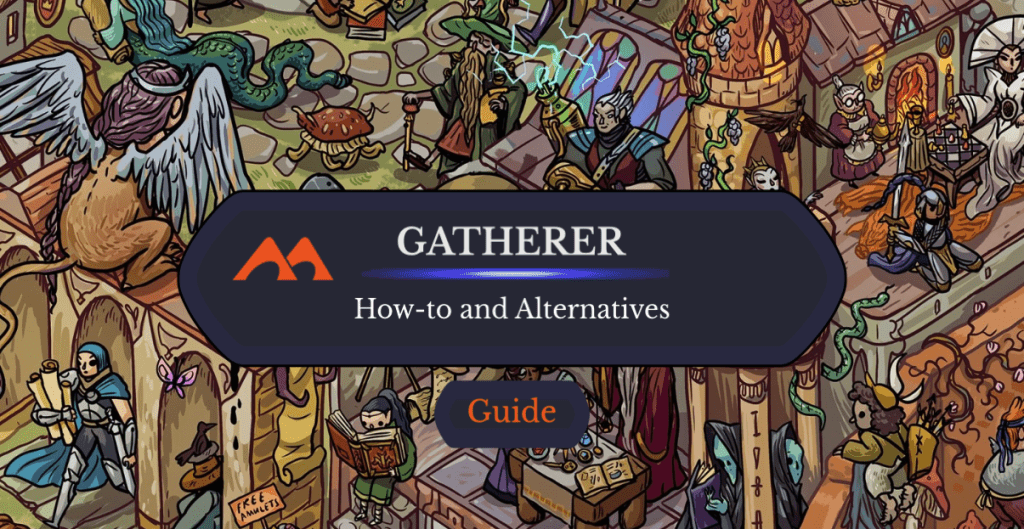
Frantic Search | Illustration by Marija Tiurina
Magic is a big game. Thirty years of history with a consistent output of new sets and cards has left us with more than 27,000 unique cards. That’s a lot of cards! It’d be nearly impossible to know even half of them, so having a good and reliable database is fundamental.
Of course, if you’re already building a database for this massive number of lands and spells, you might as well make it so that you can search for specific things. Be it card type, color, effect, or even specific factions or settings in the multiverse.
We all know Wizards is a huge company that makes tons of money and has plenty of resources. It should pretty much be obvious that a company like this would certainly build this database so people can more comfortably play their game, right? Right? Well….
Today we’re here to talk about Gatherer, the official database for Magic cards.
What Is Gatherer?
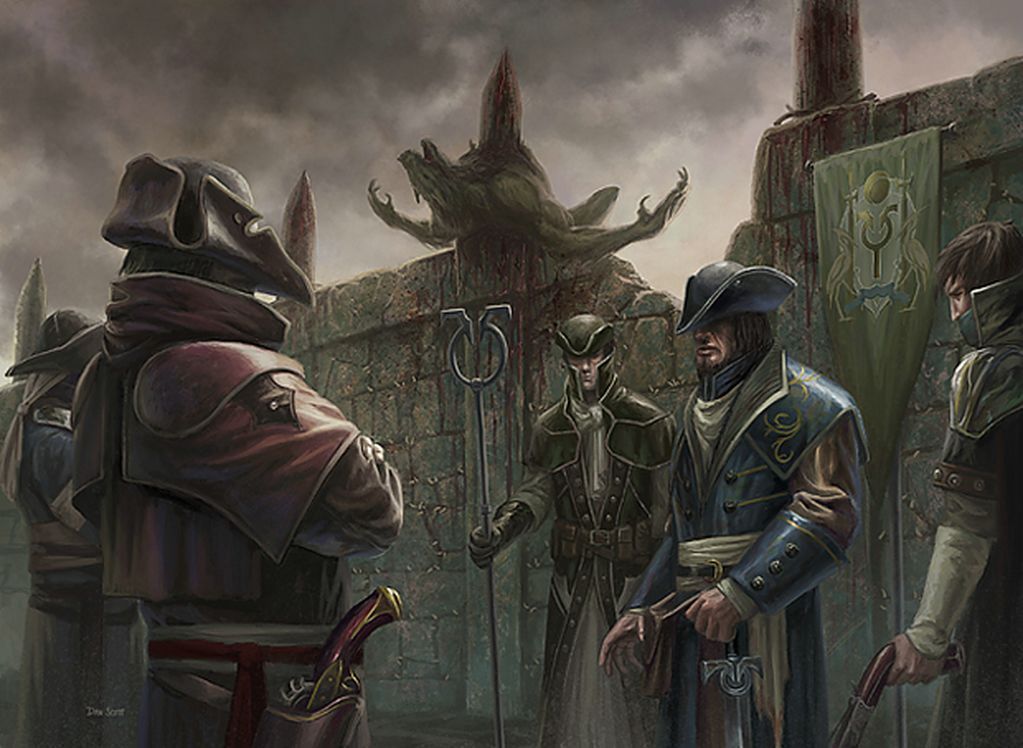
Gather the Townsfolk | Illustration by Dan Scott
Gatherer is a database for Magic cards run by Wizards of the Coast. Gatherer doesn’t simply store info on cards, but it can also serve as a way to search for cards based on a series of different criteria and terms. It basically allows you access to this massive library of cards to try to search for and find what you may need.
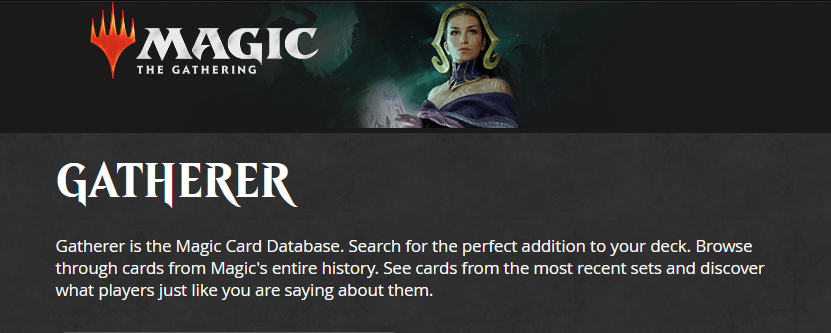
Gatherer also serves as a way to centralize things like errata and updates to wordings and cards. A lot of old cards (and not that old, too) have some sketchy wording when it comes to abilities and mechanics. Gatherer offers updated and improved wordings for those cards, allowing players to double-check certain things without the need of a judge or pro player (most of the time, anyway).
It also allows you to check when and where cards have been reprinted and confirm format legalities, and it even features community options to rate cards or comment on them to open up discussion.
How To Use Gatherer
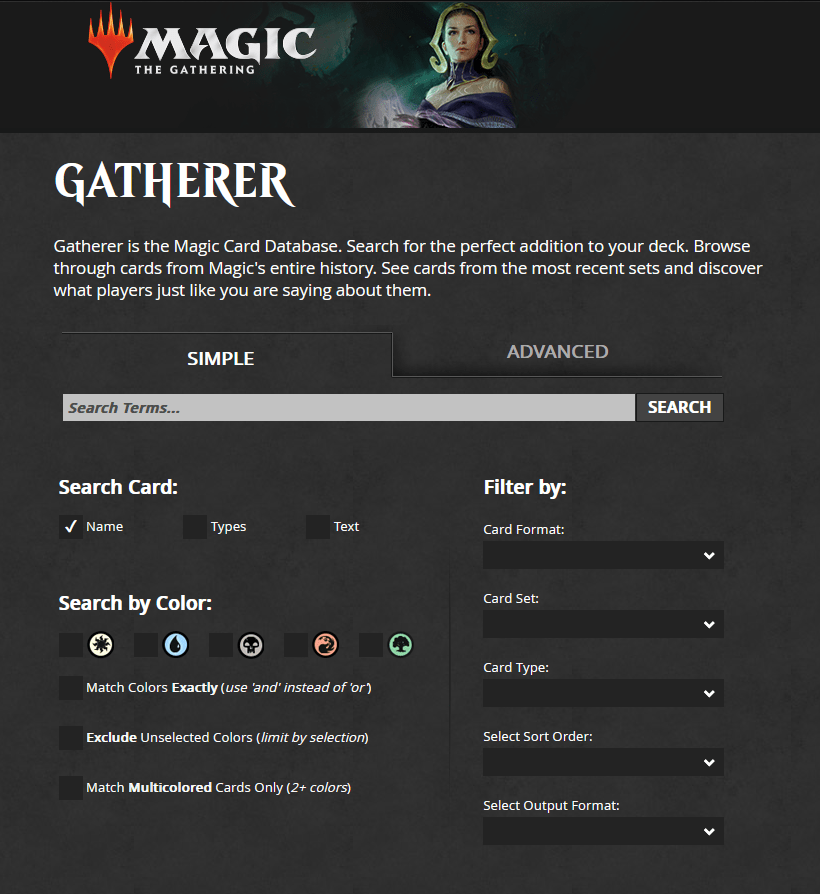
As soon as you open up Gatherer, you’ll be met with the simple search screen, which shows several different categories to search for cards.
Simple Search
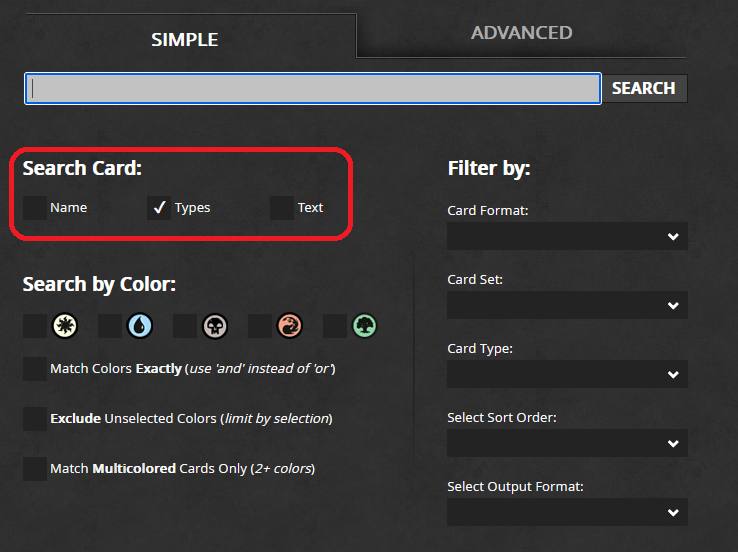
The most basic search you can perform through Gatherer consists of choosing between three categories, and then searching for specific words within those categories.
The three categories are:
- Name: This allows you to search for cards that have whichever specific word you search for in their name.
- Types: This focuses the search on card type and subtypes, checking any and all of them for the word or words you search for.
- Text: This checks card text for the word or words you search for, which makes it ideal if you’re trying to find specific mechanics or effects.
Once you’ve picked one or more of these categories, type in whichever word you want to search for and click search or hit enter, which should show you what you searched for.
The next set of categories revolves around colors. This combines with the previous step to limit your search to the specific colors you want.
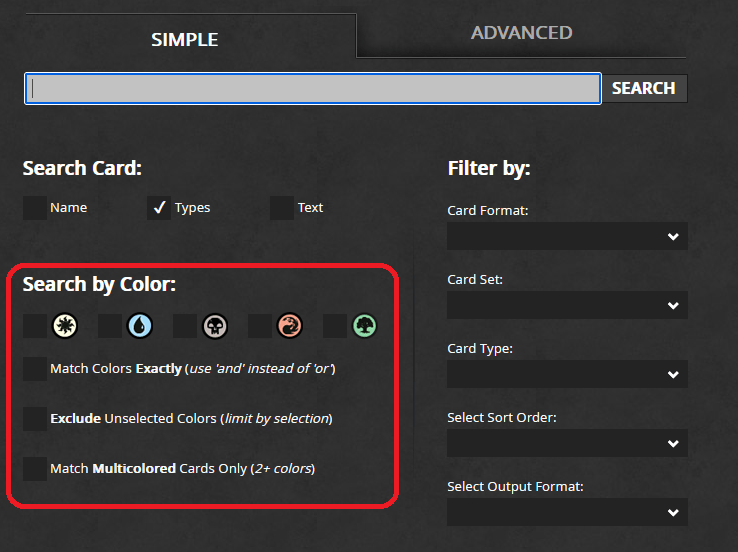
The most basic customization you can do with this is choosing which colors you want to show up in your search. Just mark the ones you want and search away.
Gatherer allows you to get a bit more specific with specific color conditions. The options are:
- Match colors exactly: If you simply pick two colors (let’s say black and red) and look for cards, Gatherer shows you cards that are mono-red, mono-black, Rakdos, any two color combination with black or red, and three-or-more-colors combinations that include either of the chosen colors. If you activate this option, Gatherer shows cards that specifically have black and red simultaneously, showing Rakdos cards and any three-or-more-colors combinations that have Rakdos in them.
- Exclude unselected colors: If you mark this option, Gatherer won’t show cards that have any of the unselected colors. If you search for cards within black or red with this option selected, it only shows mono-red, mono-black, or Rakdos cards.
- Match multicolored cards only: Searching for cards with this option activated shows results exclusively for multicolored cards. If you search for cards within red and black, this shows any multicolored cards that include those colors; keep in mind that if you only have this option active, this won’t just show Rakdos cards but also other color combinations as long as they include either red or black. It’ll simply filter out mono-colored cards.
You can also refine our search further, by using filters.
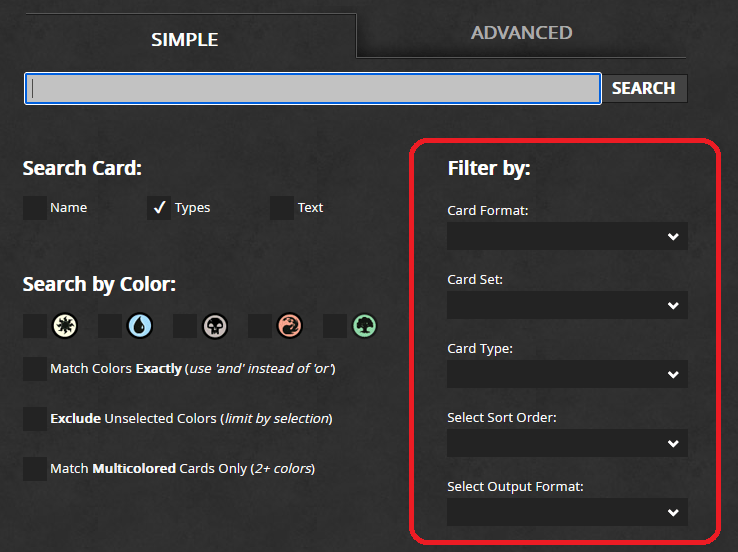
Now we’re getting into more specific filters for your search.
Card format: Are you building your deck for Commander? Alchemy? Standard? This allows you to search for cards that are legal in any specific format. It covers a total of 11 sanctioned formats.
Card set: This lets you search for cards from a ton of specific sets and releases. This doesn’t just include what we usually understand as sets (namely Standard- or Modern-legal sets, basically) but also smaller releases like duel decks, Commander precons, anthologies, etc.
Card type: Within this category you’ll find a list of different card types and supertypes like legendary, artifact, planeswalker, etc. allowing you to narrow your search. This list also includes some interesting entries like “eaturecray” and “scariest” thanks to weird Un-set cards. Keep in mind this list doesn’t include creature types, so while you can narrow your search to “creatures,” you won’t be able to narrow it to “otter” or “capybara” here.
Select Sort Order: Here you can choose the criteria used to order your results. Some of them, like power, toughness, or mana value should be relatively known terms for players who’re already at this point.
However, we have a handful of lesser-known options like color weight, which essentially boils down to how much of a specific color a card needs to be played, similarly to devotion (as an example, Dark Ritual’s color weight is lower than that of Grave Titan); or community rating, which orders cards according to a rating from 1 to 5 assigned by MTG players; basically, you can search for mono-black instants using this option to show those considered best by the community first, and those deemed worst at the bottom.
Select Output Format: This portion lets you choose how you want your results to be displayed. The different formats appear as follows:
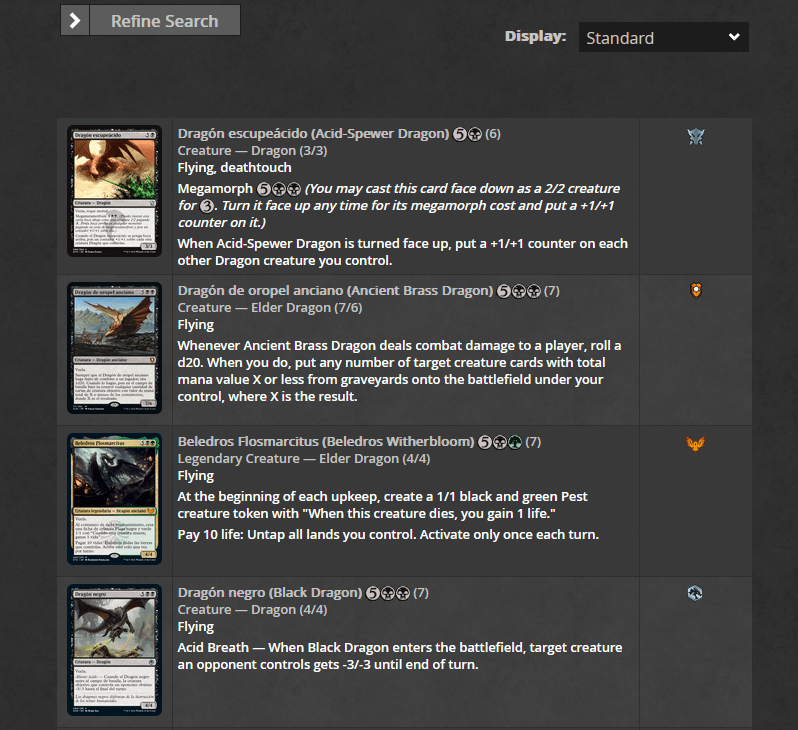
Standard shows a small picture of the card and relevant information on it like mana value, name, type, oracle text, set, and rarity.
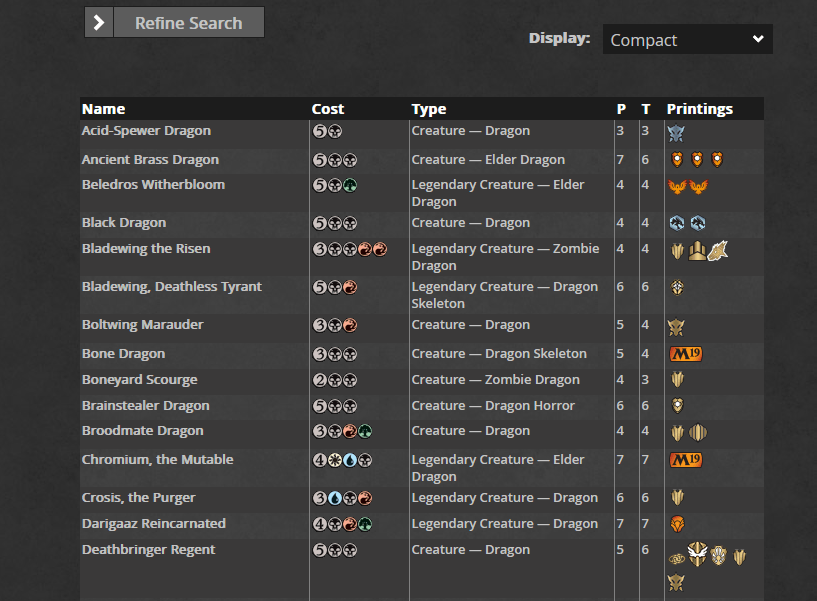
Compact shows essentially the same information as standard, but removing the card image entirely, focusing on the concrete information and stats.
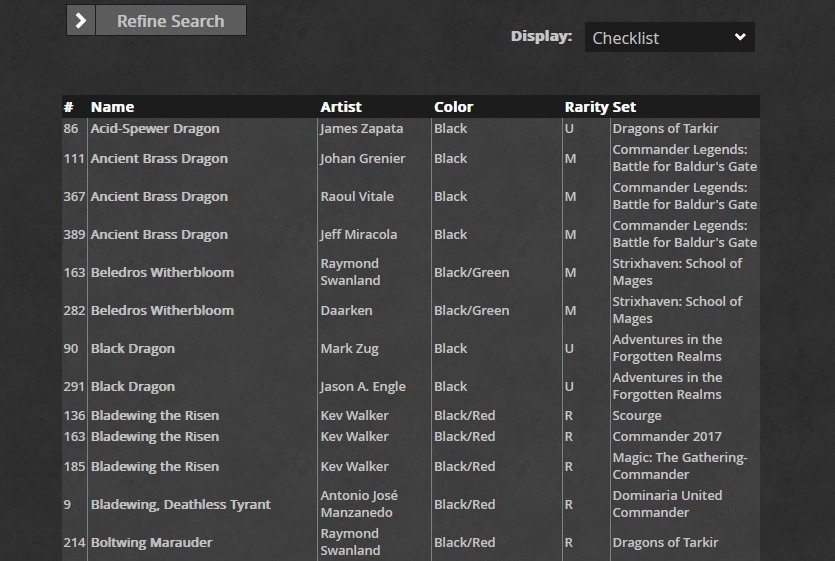
Checklist has a more collector-centric approach, showing the card’s set, number, rarity, color, and artist.
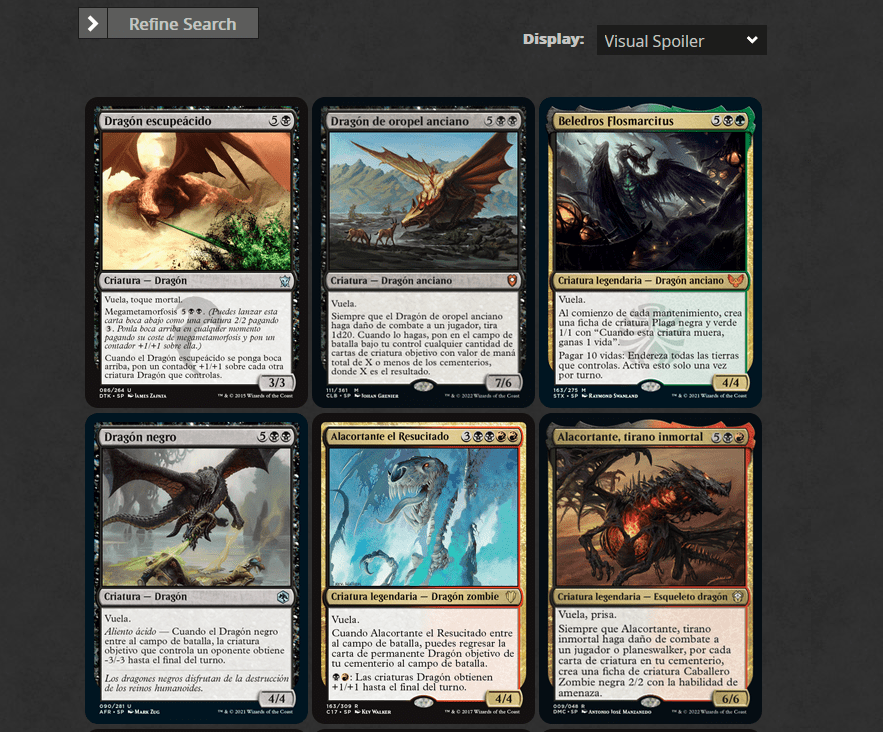
Finally, visual spoiler simply shows images for each of the cards.
Gatherer also lets you browse cards entirely at random.
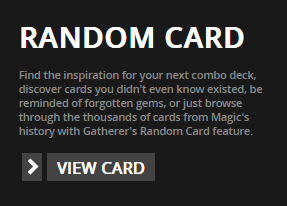
You can click here to get sent to any random card from within Magic’s massive catalogue. As the page itself says, this can serve as inspiration for combos or decks, as ways of discovering obscure cards, or simply browsing through such a huge number of cards with no true intention or order.
You can also check what other players have been looking for in the Popular Searches.
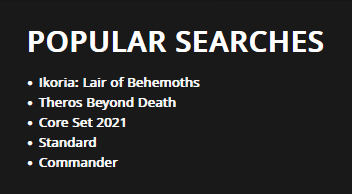
This is a display of the most popular recent searches on the website. It bears mentioning that I took this screenshot myself in December of 2023, so those of you who pay attention to the list shown may find it a little bit strange.
Advanced Search
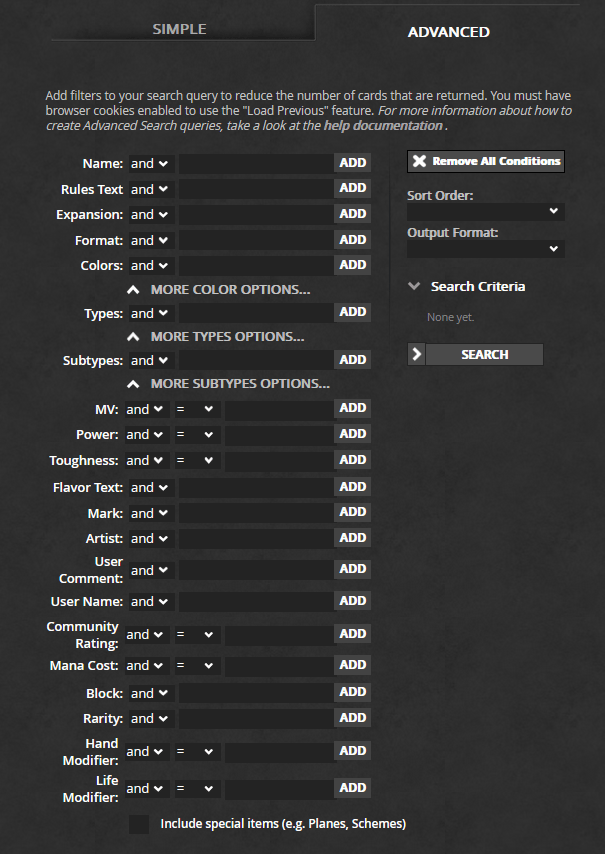
All the previous steps should be just about enough for anyone wanting to search cards to fit certain archetypes or playstyles. However, there’s always someone who needs to go deeper. To get more specific, more complex. Advanced search is made specifically for them.
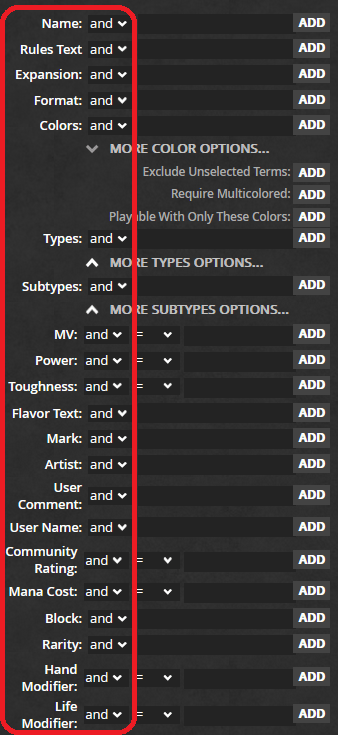
The advanced search page lets you choose from tons of options to make your search as specific as possible. The criteria you can include in your search are:
- Name: One or more words that show up in the card’s name.
- Rules Text: One or more words that show up in the card’s rules text.
- Expansion: What specific expansion you want to search through, whether to reduce the number of wrong results if you know what set the card was printed in, or if you want to find a specific reprint.
- Format: Specify a format to search cards that are legal in that specific one; this is pretty much useless for formats like Commander, but it can be particularly useful for formats like Modern, Pauper, or Standard.
- Colors: What color or colors you want the card to be in. This also has additional options to exclude unselected colors, only show multicolored cards, and show cards that are only playable with the specified colors.
- Types: What type or types the cards you’re looking for fit into. This has an additional option to exclude any unselected terms. Supertypes like legendary are included here.
- Subtypes: What subtypes the cards fit into, particularly useful for creature cards. This one also lets you exclude unselected terms.
- MV: Mana value to filter the specific costs of the cards you’re searching for. This lets you choose if you want the mana value to be equal, more (or equal) than, or less (or equal) than the specified number.
- Power: For creature power stats. Just as MV, this lets you choose if you want the search to be equal, higher, or lower than the searched number.
- Toughness: Pretty much the same as power, but for toughness.
- Flavor Text: Allows you to search for specific words in the flavor text of cards, much more lore-oriented than the other options.
- Mark: Lets you search for cards with a specific watermark, such as the guild watermarks from the different Ravnica sets.
- Artist: Allows you to search for cards with art by a specific artist.
- User Comment: Gatherer has a community feature, so you can use this criteria to search for cards that may have comments featuring specific words or sentences, maybe to find if someone is talking about certain archetypes or strategies.
- User Name: Similar to the previous criteria, but to find cards where specific users have commented.
- Community Rating: Gatherer allows the community to rate cards, and this feature allows you to choose cards that equal, above, or below a certain rating to filter out any “bad” ones.
- Mana Cost: Somewhat similar to MV, this allows you to search for cards that have specific things in their mana cost (for example, you could search for cards that specifically ask for two colorless in their mana cost).
- Block: Specify which blocks to search for, either to reduce possible results or to find specific reprints.
- Rarity: Allows you to search for cards of any specific rarity.
- Hand Modifier: Specific to the Vanguard format, lets you search for cards that modify your starting and maximum hand size.
- Life Modifier: Same as hand modifier, but for life totals.
- Include special items: Mark this option so the results show non-conventional cards like planes, conspiracies, schemes, etc.
Problems With Gatherer
Now that we’ve been through how you can use Gatherer, let me give you a piece of advice: don’t use Gatherer. The page is plagued with issues and bugs, making it very uncomfortable to use at times.
For starters, even though the search engine may look intuitive and easy to use, it can prove to be far from that. Once you’ve used it enough times, you’ll learn how to work around its kinks, but there are much better card-search engines that work in a more intuitive way.
Sometimes cards in Gatherer won’t show card art, are missing info, and a host of other problems. Let’s take a look at these two searches for Bladewing the Risen, one from Gatherer and one from Scryfall.
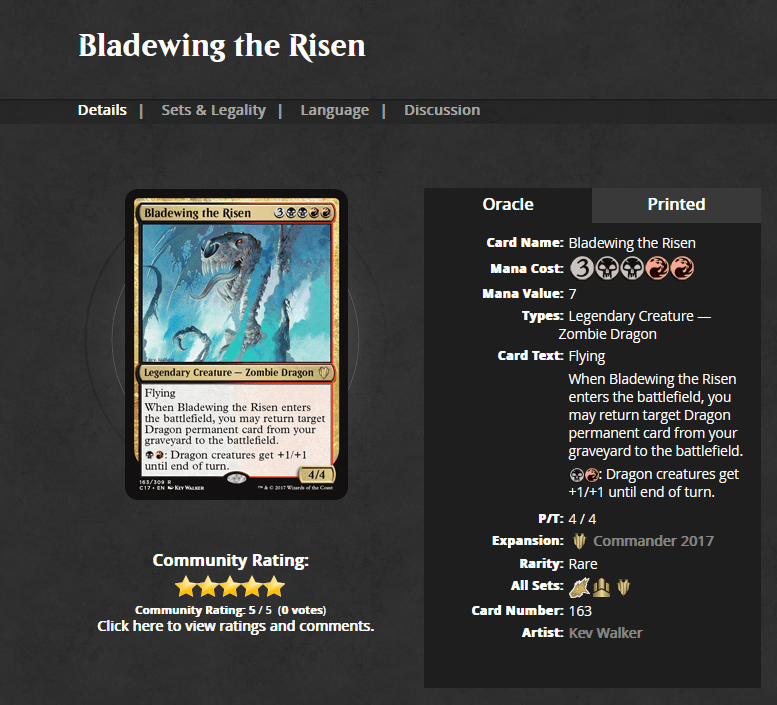
The Gatherer search you can see here has the card info split into two different tabs. One has the image of the card, all the technical info (rules text, mana cost, etc.), and the community rating. On the other tab, we can see the sets in which it was printed and the formats in which it’s legal.
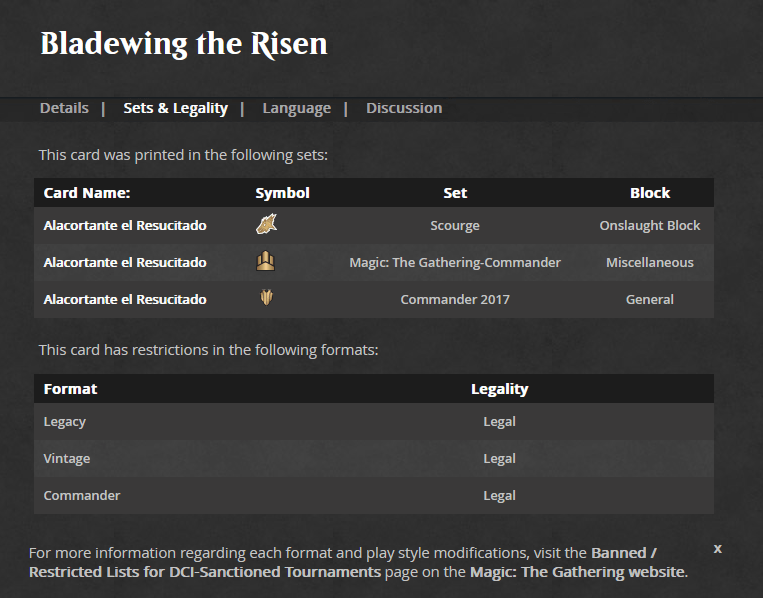
Now compare those to the Scryfall search. In a single screen, we get all the relevant information for this card. Technical info, legality, reprints (plus secondary market value, although I understand why a Wizard’s official page would avoid showing that). In Scryfall, if you rest your mouse over any of the different reprints, it’ll preview that reprint’s version of the card, which lets you quickly find things like alternate arts.
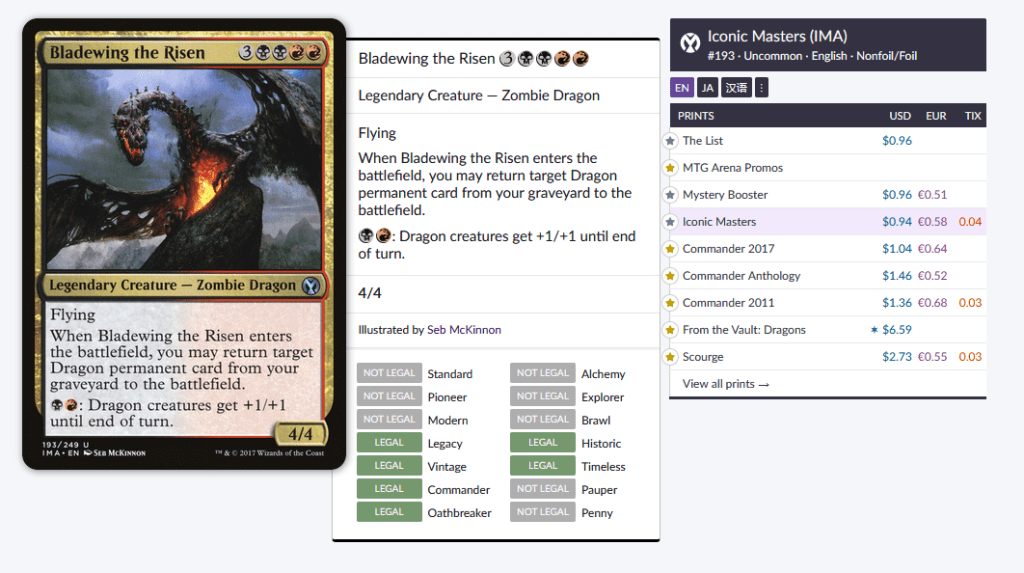
But more importantly, I want you to compare the legality and reprints parts in both sites. You’ll notice Gatherer’s lists are both much shorter than Scryfall’s, meaning the info is incomplete. This makes it harder to verify certain info at a glance.
You may also notice how my Gatherer screenshot shows Bladewing the Risen’s name as “Alacortante el Resucitado”. That’s because I live in a country where Spanish is our main language, and even though Gatherer lets me see versions of the card printed in English, it ultimately forces the page to show a lot of things in Spanish. If it’d allow me to change languages easily, this wouldn’t be an issue, but it doesn’t.
Since I mostly play Magic with cards in English, this means I have tons of issues finding some things in Gatherer because the site itself gets the languages mixed up, making it unnecessarily hard to find certain cards. This may be anecdotal, but keep in mind there’s a ton of Magic players around the world, and pretty much any who try to use Gatherer outside English-speaking countries will run into issues like this.
(Editor’s note: To change the preferred language of card printings, you can scroll to the bottom of any Gatherer page and click either “Language” or “Settings”. From there, you can change your preferred language and click “Save”. This doesn’t change Gatherer’s display language, but it does change the language on the displayed cards and the language used when searching by Card Name. When looking at an individual card in another language, the Oracle tab displays the English text while the Printed tab displays text in your preferred language, if applicable. You can’t, for example, search for Black Lotus in a language in which it wasn’t printed.)
I previously mentioned the “popular searches” section. The most popular searches in Gatherer are Ikoria: Lair of Behemoths, Theros Beyond Death, and Core Set 2021. because pretty much no one uses Gatherer anymore, leading to the site itself becoming more and more outdated.
Those cool community features like discussions and ratings? Most new cards have no discussions on them, and the site by default gives all cards a five-star rating, and without any input from players, that means all new cards have five stars regardless of how good they may actually be.
On a more personal note, I find Gatherer kind of ugly. I don’t like the way it uses space, and it feels unoptimized for user interaction. But that’s more based on taste, I’m no web designer or anything.
If Gatherer is such a mess, what options do we have?
Gatherer Alternatives
The function that Gatherer is meant to serve is one that’s pretty much key to having a decent experience as a Magic player. Whether you’re building a deck or simply want to know more about Magic’s different cards, you need a complete database.
#4. mtg.wtf (Browser)
I only just found out about mtg.wtf while doing research on alternatives to Gatherer. While I don’t entirely love the barebones design the site has, I think it’s ultimately simple to use and pretty convenient.
The site itself has a pretty comprehensive tab explaining different syntax options to make your search more precise. This may take a little learning time, but it’ll click relatively quickly, and it opens up access to a great tool.
The display of individual cards is pretty complete in terms of sheer info, which I absolutely compliment. The simple look is something that puts me off a little bit, but ultimately that boils down to personal preference. If you don’t mind the more minimalistic appearance to the page, you can absolutely use it without issue.
#3. MTG Familiar (Android)
This free app not only includes a search engine for cards but also a series of other tools for Magic players. To start off with the positives, I think these additional tools are honestly pretty great. The app has functions for gameplay like a life counter, a mana pool tracker, or dice, as well as some “meta” functionalities like rules reminders, a deck builder, a card wish list, and even a way to trade cards comparing their average value.
Referring to the card search function of this app, the search engine itself is pretty thorough and relatively easy to understand. It’s ultimately pretty similar to Gatherer’s advanced search engine, letting you specify a pretty comprehensive list of criteria. Since this app is updated, unlike Gatherer, you even get some additional functionalities like being able to search only for commanders or search cards based on color identity instead of just by color.
What I personally don’t like about this app is the way results are shown. The format is essentially a list of cards with some info like rules text, mana cost, and stats. Magic is a very visual game, so having the card art on display should be a priority. Especially since you won’t see the art even when you open a specific card entry; you actually have to go an extra step and touch a button to specifically show the card image. This isn’t a terrible hindrance or anything, but I ultimately think it could be better.
#2. ManaBox (Android)
ManaBox is functionally very similar to the previous entry. It has a plethora of functionalities, from a deck builder to a rule book to a trading section to measure the values of cards. If you care more about those things, I recommend trying both out and deciding which you like more.
In terms of card search, the engine is also pretty similar to MTG Familiar’s and Gatherer’s advanced searches. What makes me prefer this one is the fact that results show card images along with an average price (you can actually select which online market you want to use to check prizes).
The display for individual cards lets you check different prizes for different prints in different marketplaces. It also has a tab for rulings and legalities. It also shows the card art as well as the info like rules text, stats, and mana cost.
I ultimately find ManaBox to be a bit more complete and easier to use and understand than the previous entry, but considering they’re both free apps I honestly can’t complain about any of them.
#1. Scryfall (Browser)
If you’ve been playing Magic for some time, you’ve probably already come across Scryfall, and for good reason. This browser app is the ultimate card searcher for Magic. Its more basic functionalities are pretty intuitive and easy to use, while it also has a more complex system once you start checking its syntax guide.
Scryfall has a bit of a learning curve thanks to its syntax system, but it’s not too steep. Once you get a hang of it, you can find almost anything relatively easily. The results display is great since it lets you choose from a ton of different options on how to show said results, as well as how to order them based on tons of different criteria. While Scryfall doesn’t really have a community function like Gatherer did, it does collaborate with EDHRec so you can sort results based on EDHRec popularity. This isn’t exactly perfect if you’re looking for cards in other formats, but it allows for at least some fast way to check for popular cards.
The individual card display, as I showed earlier when comparing it to Gatherer’s, is super clean and complete. Pretty much all the important information you may need is right there and easy to understand. They also have links to several different sites like EDHRec’s card analysis, TCGPlayer’s articles about the card, and even marketplace links to buy it. It also allows you to download a .PNG of the card, or one of the card art alone. It even has a link to that card in Gatherer!
Scryfall may not have some of the extra functionalities that the mobile apps do, but we’re ultimately looking at replacements for Gatherer, so I’m putting complete priority on the search engine and card display. With this in mind, Scryfall is by far the best possible option. I actually have and use the ManaBox app on my phone, but if I simply need to search for cards, I’ll always refer to Scryfall, even when on my phone. I have a tab in my phone’s browser with Scryfall always open, just in case.
I also want to give an honorable mention to Scryfall Tagger as a wonderful complement to Scryfall. Tagger lets you search for things based on tags like characters, art details, lore, specific mechanics or archetypes, etc. I don’t include it as its own entry because this engine ultimately depends on Scryfall itself, so think of it as a kind of expansion.
Wrap Up
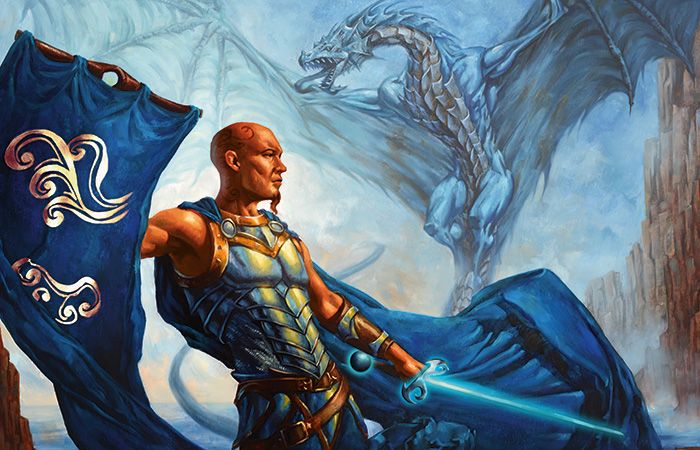
Paragon of Gathering Mists | Illustration by Michael C. Hayes
At some point in history, Gatherer was the go-to option when players wanted to find specific types of cards, or if they wanted to check for updates to a card’s wording and rules texts. It served an important function among players, and I’m honestly kind of sad to see how outdated and hard to use it’s become. That said, I’m glad Scryfall has filled that niche and serves as a spiritual successor to Gatherer. It’s hard to overstate just how useful a good, effective search engine with updated rulings and oracle text can be.
But enough about me. What’s your favorite search engine for MTG cards? Did I miss any? Have you ever tried using Gatherer? Let us know in the comments! And while you’re here, make sure to pay our Discord server a visit. There you’ll find an amazing community of MTG fans to share your hobby with!
That’s all from me for now. Have a good one, and I’ll see you next time!
Follow Draftsim for awesome articles and set updates: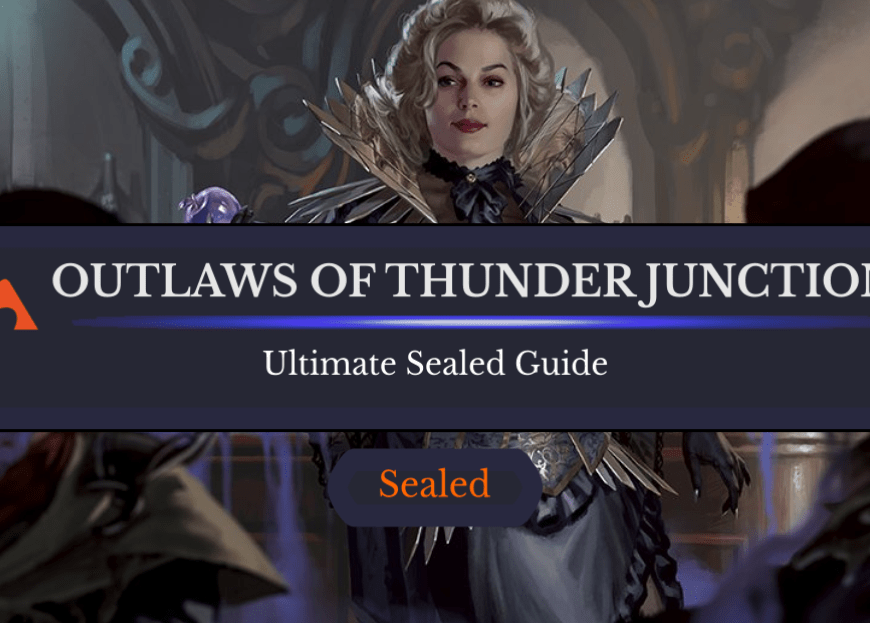
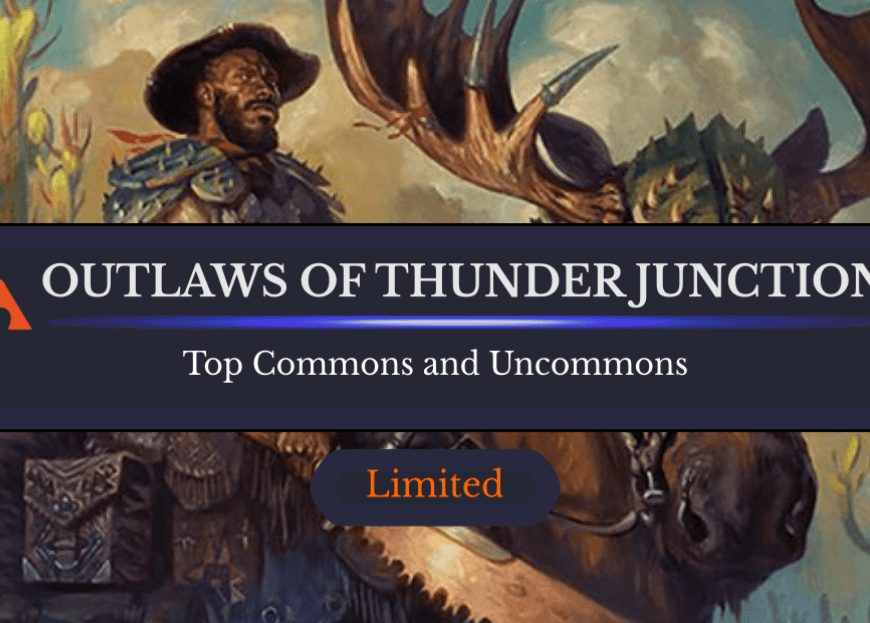
Add Comment